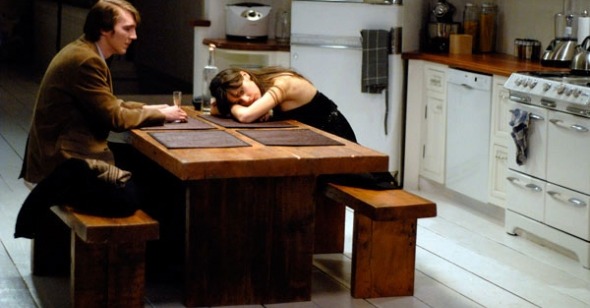Puny
by Michael Koresky
Gigantic
Dir. Matt Aselton, U.S., First Independent Pictures
Two tired, and seemingly opposed, trademarks of recent American independent cinema make for a deadly combination in Matt Aselton’s Gigantic. It’s an arch, self-aware puppy-dog love story, shot through with an overly aestheticized, almost clinical detachment. This off-putting hybrid of idiosyncratic romantic comedy and surreal, interiorized character portrait is never able to remotely reconcile its two tendencies: to both ingratiate the audience with its main characters’ sizable quirks and to visually and sentimentally distance us from those same characters. The result is restless yet at the same inert, zigzagging with thematic inconsistencies in its telling of the hesitant romance between dissatisfied 29-year-old mattress salesman Brian Weathersby (Paul Dano) and sprightly-spunky-zombified Harriet “Happy” Lolly (Zooey Deschanel, who’s sort of an expert at this point at sprightly-spunky-zombified young women), who have little more in common than pallid demeanors and pretentiously literate-sounding names.
Brian, played by Dano as expectedly passive, disheveled, and inward (is there any other kind of male protagonist in lower budgeted American films anymore?), has, according to his 80-year-old father (Ed Asner, oddly) been hankering to adopt a Chinese baby for years—ever since his eighth birthday, when he asked for one rather than a bike. This bit of family trivia, thrown away in a line to an adoption agent, offers a key to the preposterousness of Aselton and Adam Nagata’s script, which builds characters not from convincing histories and motivations but rather from patchworks of strenuously overdetermined eccentricities. Brian’s driven paternal instinct does allow the film to indulge in its one worthy, original idea, which is that it’s the man’s biological clock that drives and threatens his relationship, and that it’s Happy who has the cold feet. Rather than spin this somewhat winning conceit into an airy, romantic-comic depiction of pragmatism versus freedom, however, Aselton creates a somber, perhaps unintentionally dreadful mood piece that, in collusion with its two dead-eyed main principles, ensures we remain as emotionally far from Brian and Happy as possible.
One reason for this is that Gigantic often seems as though it’s been hijacked by its director of photography, a common occurrence when green directors hire seasoned pros to lens their debuts. In this case, that pro would be Peter Donahue, whose elegantly austere work for Errol Morris (Mr. Death, The Fog of War) and Phil Morrison (Junebug) was perfectly wedded to the material, whether it be the former’s bug-under-glass interrogatory aesthetic or the latter’s hushed minimalism. Here, Donahue’s camera, in static long takes, is often perched across the room from the actors, surveying them like mannequins in some immaculate tableau (in one shot, as Deschanel slowly approaches the camera, with John Goodman, as her loutish father, supine in the foreground, both surrounded by the Kubrickian white of a modern model kitchen, she looks like nothing less than a materializing Kiyoshi Kurosawa apparition). Yet such tonally wrong compositions are still preferable to the ill-framed, awkward medium close-ups, disorientingly spliced together, that make up many of the film’s dialogue sequences (more than a few times the actors bob out of the shot, or their faces are half cut off at the edge).
It’s not simply the chilly, oppressive cinematography that ensures the film’s archness. Overwritten metaphors are abundant and exhausting—early on, Brian visits a research scientist friend, who, speaking of one of his antidepressant-tested lab rats says, “Mr. T’s always a little bit of a quitter” and the paralleling lands with a thud; and Brian’s altercations with the manifestation of his fears, a violent, schizoid homeless man, reminded me of nothing more than Kiefer Sutherland’s goofy battles with his childhood guilt-ghost in Flatliners. Meanwhile, the film’s stabs at humor toggle between easy anti-PC throwaways (Goodman’s ostentatious businessman’s anti-Semitic remarks and his berating of his personal assistant for his “disgusting” fire-island weekends are meant to be adorably outmoded rather than offensive) and head-scratchers that should have ended up on the cutting-room floor (Brian’s screechy brother and business partners getting happy endings in a massage parlor).
Of course, extraneous bits aside, a film like Gigantic lives or dies on the strength of its protagonists. These actors have undeniable charms (Dano has proven magnetic in supporting roles in The King and There Will Be Blood; Deschanel’s monotone and wan beauty, when directed right, can seem downright witty), but it would be difficult to envision anyone truly selling such dialogue as Happy’s query to Brian, whom she’s basically just met, while in a sterile doctor’s waiting room: “Do you have any interest in having sex with me?” Dano responds with an unsurprised, dispassionate “Yup.” It’s an appropriate response for this shrug of a film.
